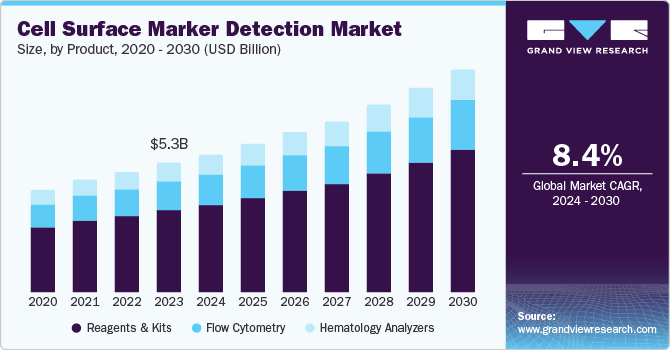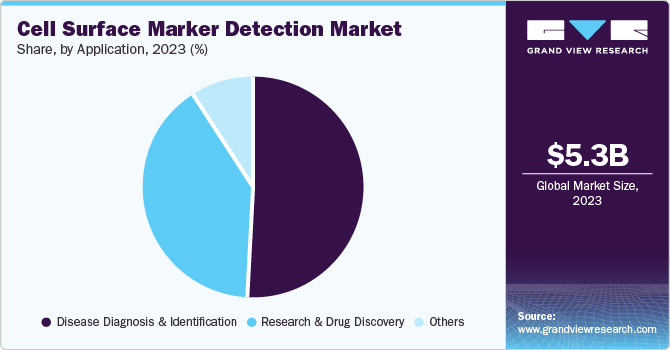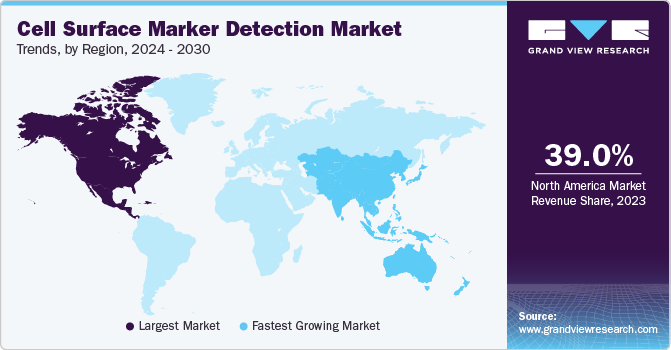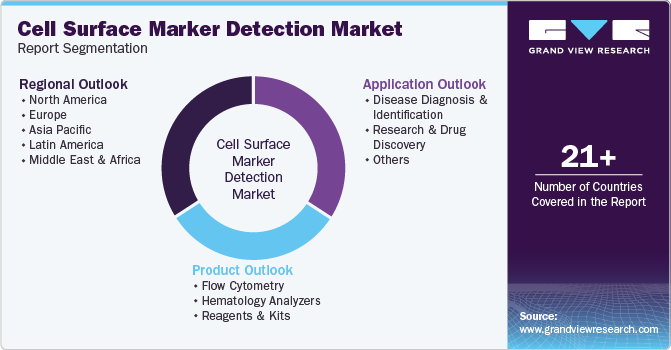Cell Surface Marker Detection Market Trends
The global cell surface marker detection market size was valued at USD 5.26 billion in 2023 and is projected to grow at a CAGR of 8.4% from 2024 to 2030. The increasing demand for precision medicine is significantly boosting the market, as cell surface markers play a crucial role in identifying specific cell types and tailoring treatments accordingly. Additionally, advancements in diagnostic technologies are enhancing the accuracy and efficiency of cell surface marker detection, making it more accessible and reliable for various applications.

The rising adoption of in vitro diagnostics is also contributing to market expansion, as these diagnostics rely heavily on cell surface markers for disease detection and monitoring. Furthermore, the growing prevalence of chronic diseases and the need for early diagnosis are propelling the demand for advanced diagnostic tools, including cell surface marker detection.
The increasing amount of research projects on molecular biology techniques and cell biology is expected to fuel market growth. Additionally, investments by major players in developing instruments with automated solutions and methods are also anticipated to contribute to this growth.
Product Insights
The reagents & kits segment dominated the market with a revenue share of 63.3% in 2023. The consumables’ essential role in various detection techniques, including flow cytometry, immunohistochemistry (IHC), and Western blotting primarily drive this dominance. These reagents and kits' non-reusable nature necessitates continuous reorders, fueling consistent demand. Additionally, the increasing focus on precision medicine and the rising prevalence of chronic diseases have amplified the need for accurate and reliable diagnostic tools, further boosting the demand for these products. The advancements in diagnostic technologies and the growing adoption of in vitro diagnostics also contribute to the segment's robust growth.
The hematology analyzers segment is expected to witness a significant CAGR of 8.2% over the forecast period. The increasing prevalence of blood-related disorders and chronic diseases necessitates advanced diagnostic tools, boosting the demand for hematology analyzers. Additionally, technological advancements in these analyzers, such as enhanced automation and improved accuracy, make them more efficient and reliable for clinical use. The rising adoption of precision medicine, which relies heavily on accurate blood analysis, further propels the segment’s growth.
Application Insights
The disease diagnosis & identification segment dominated the market with a revenue share of 50.6% in 2023. The increasing prevalence of chronic diseases such as cancer and autoimmune disorders necessitate precise and early diagnosis. The ability of cell surface markers to accurately identify and isolate specific cell types has revolutionized diagnostic practices, making them indispensable in clinical settings. Additionally, advancements in diagnostic technologies, including high-throughput tools and automation, have enhanced the efficiency and reliability of disease detection. The growing emphasis on precision medicine, which relies heavily on accurate disease diagnosis, further propels the demand for cell surface marker detection.

Research & drug discovery is expected to grow at the fastest CAGR over the forecast period. The increasing prevalence of chronic diseases such as cancer, cardiovascular diseases, and autoimmune disorders necessitates the development of new and effective treatments, thereby boosting the demand for advanced research tools. Technological advancements in cell surface marker detection, including high-throughput screening and automation, are enhancing the efficiency and accuracy of drug discovery processes. Additionally, the growing emphasis on precision medicine, which relies heavily on identifying specific cell markers to develop targeted therapies, further propels the segment’s growth. Collaborations between pharmaceutical companies and research institutions are also fostering innovation and expanding the application of cell surface marker detection in drug discovery. These drivers collectively boosts the segment growth over the forecast period.
Regional Insights
North America cell surface marker detection market dominated the global market with a revenue share of 39.0% in 2023. The region’s advanced healthcare infrastructure and high adoption rate of innovative diagnostic technologies play a crucial role.

U.S. Cell Surface Marker Detection Market Trends
The U.S. cell surface marker detection market dominated the North American market with the largest revenue share of 88.0% in 2023. The increasing prevalence of chronic diseases and the growing emphasis on precision medicine boost the demand for cell surface marker detection. Moreover, supportive government policies and substantial funding for healthcare research contribute to the market's robust
Europe Cell Surface Marker Detection Market Trends
Europe's market cell surface marker detection was identified as a lucrative region in 2023. The region’s strong emphasis on healthcare innovation and the presence of well-established research institutions and biotechnology companies significantly contribute to market growth.
The UK cell surface marker detection market is expected to grow significantly over the forecast period. The region’s growth is attributed to the supportive government policies and substantial investments in healthcare research enhance the market’s attractiveness.
Asia Pacific Cell Surface Marker Detection Market Trends
Asia Pacific cell surface marker detection market is expected to grow at the fastest CAGR of 8.7% over the forecast period. Several factors, including the increasing prevalence of chronic diseases and the rising demand for advanced diagnostic tools in the region, drive this rapid growth. The expanding healthcare infrastructure and growing investments in research and development also play a crucial role in propelling the market forward.
Key Cell Surface Marker Detection Company Insights
Some key companies in the cell surface marker detection market include Abbott Laboratories, Danaher Corporation (Beckman Coulter Inc.), Becton, Dickinson and Company, Bio Rad Laboratories Inc., and others. To position themselves more competitively in the market, key players actively engage in various partnerships, mergers, and acquisitions. This strategic approach aims to expand their device range and extend their presence into new business territories.
-
Becton, Dickinson and Company is a global medical technology firm that plays a significant role in the cell surface marker detection market. It offers an innovative services, products, and technologies for clinical and research applications. Furthermore, the company is a leader in the field of flow cytometry.
Key Cell Surface Marker Detection Companies:
The following are the leading companies in the cell surface mrker detection market. These companies collectively hold the largest market share and dictate industry trends.
- Abbott Laboratories
- Danaher Corporation (Beckman Coulter Inc.)
- Becton, Dickinson and Company
- Bio Rad Laboratories Inc.
- F. Hoffmann-La Roche Ltd
- Diasorin SpA (Luminex Corporation)
- Nihon Kohden Corporation
- Qiagen NV
- Siemens Healthineers
- Thermo Fisher Scientific Inc.
Cell Surface Marker Detection Market Report Scope
|
Report Attribute
|
Details
|
|
Market size value in 2024
|
USD 5.63 billion
|
|
Revenue forecast in 2030
|
USD 9.12 billion
|
|
Growth rate
|
CAGR of 8.4% from 2024 to 2030
|
|
Base year for estimation
|
2023
|
|
Historical data
|
2018 - 2022
|
|
Forecast period
|
2024 - 2030
|
|
Quantitative units
|
Revenue in USD million/billion, and CAGR from 2024 to 2030
|
|
Report coverage
|
Revenue forecast, company ranking, competitive landscape, growth factors, and trends
|
|
Segments covered
|
Product, application, region
|
|
Regional scope
|
North America, Europe, Asia Pacific, Latin America, MEA
|
|
Country scope
|
U.S., Canada, Mexico, UK, Germany, France, Italy, Spain, Denmark Sweden, Norway, Japan, China, India, Australia, South Korea, Thailand, Brazil, Argentina, South Africa, Saudi Arabia, Kuwait and UAE
|
|
Key companies profiled
|
Abbott Laboratories; Danaher Corporation (Beckman Coulter Inc.); Becton, Dickinson and Company; Bio Rad Laboratories Inc.; F. Hoffmann-La Roche Ltd; Diasorin SpA (Luminex Corporation); Nihon Kohden Corporation; Qiagen NV; Siemens Healthineers; Thermo Fisher Scientific Inc.
|
|
Customization scope
|
Free report customization (equivalent to up to 8 analysts' working days) with purchase. Addition or alteration to country, regional & segment scope.
|
|
Pricing and purchase options
|
Avail customized purchase options to meet your exact research needs. Explore purchase options
|
Global Cell Surface Marker Detection Market Report Segmentation
This report forecasts revenue growth at global, regional, and country levels and provides an analysis of the latest industry trends in each of the sub-segments from 2018 to 2030. For this study, Grand View Research has segmented the global cell surface marker detection market report based on product, application, and region:

-
Product Outlook (Revenue, USD Million, 2018 - 2030)
-
Flow Cytometry
-
Hematology Analyzers
-
Reagents & Kits
-
Application Outlook (Revenue in USD Million, 2018 - 2030)
-
Regional Outlook (Revenue, USD Million, 2018 - 2030)
-
North America
-
Europe
-
UK
-
Germany
-
Italy
-
France
-
Spain
-
Norway
-
Sweden
-
Denmark
-
Asia Pacific
-
China
-
Japan
-
India
-
South Korea
-
Australia
-
Thailand
-
Latin America
-
Middle East Africa
-
South Africa
-
Saudi Arabia
-
UAE
-
Kuwait















